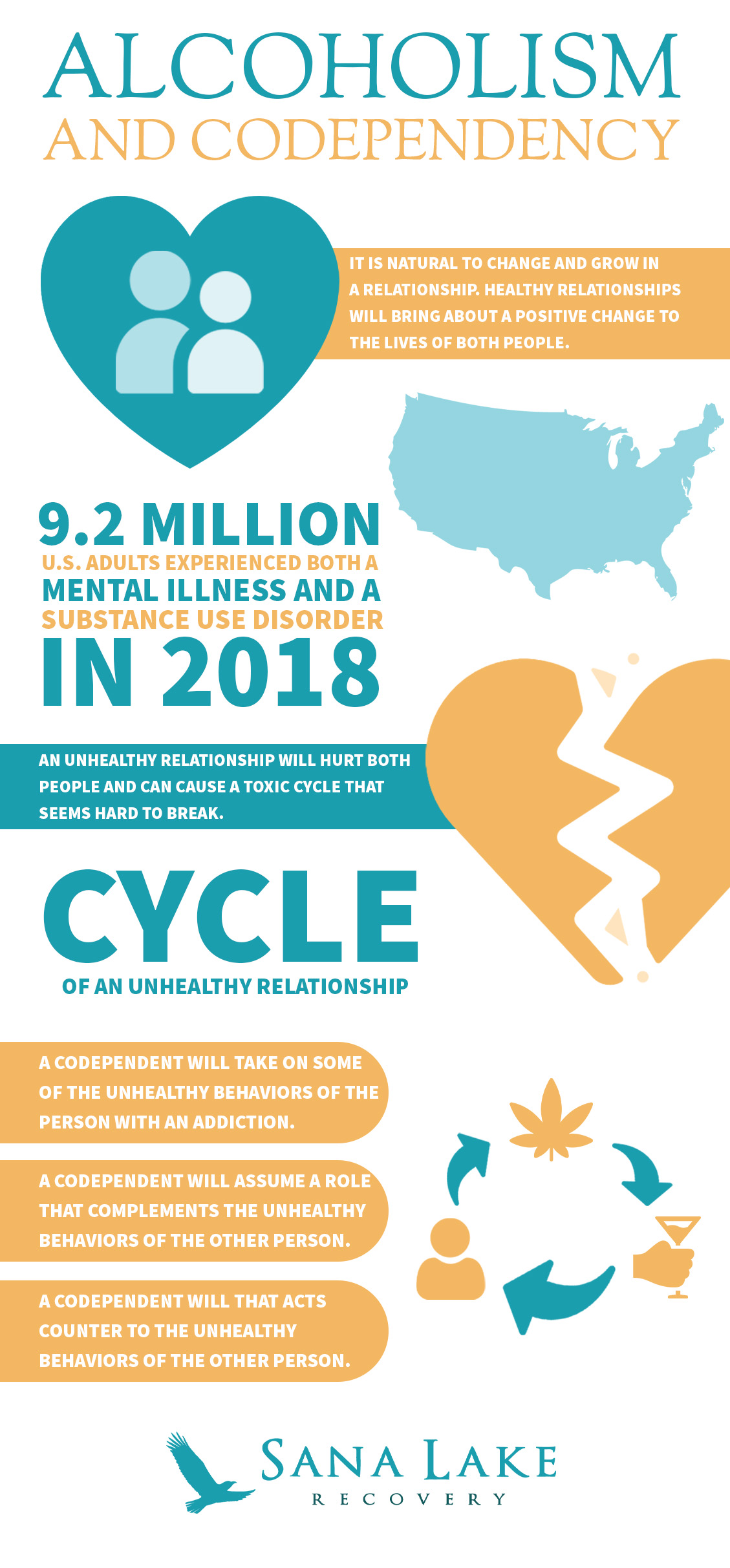Alcoholism and Codependency: How Do They Connect?
Codependency can be defined as having an unhealthy reliance on the other person in a relationship. Specifically, an individual struggling with alcoholism. Codependency can occur in a romantic relationship, friendship, or parent/child relationship. Seeking help for alcoholism and codependency can change an addicted individual’s life, as well as the people surrounding them.
What is Alcoholism?
Alcoholism, also referred to as alcohol addiction, is the most severe form of alcohol use disorder. This is when alcohol use becomes a daily habit. One may find that they’re not able to function without drinking. After all, alcohol is the most widely abused substance in the United States.
According to the National Center for Drug Abuse Statistics (NCDAS), most American adults consume alcohol at least once in their lifetime. Among them, 6.7% will develop Alcohol Use Disorder (AUD). Alcohol abuse, alcoholism, and alcohol use disorders (AUDs) kill over 3 million people each year, accounting for up to 6% of deaths worldwide. Nearly 100,000 annual deaths are attributable to alcohol abuse. More than half of them are due to long-term use.
Alcoholism impacts an individual’s physical health, as well as their mental health and personal life. From relationships to work obligations, alcohol use disorder can cause a lot of pain and issues. Struggling individuals may find themselves using alcohol as a coping mechanism.
People in a relationship with those who abuse alcohol can become codependent. Codependency on a person with an addiction can lead to an unhealthy focus on the other person’s needs over their own. This can create a toxic cycle in both people’s lives. Recognizing the signs of alcoholism and codependency can help you, and a loved one break free from the cycle by choosing to seek help.
There are many symptoms and signs one can look out for when assessing whether or not alcoholism is an issue. Fortunately, understanding these symptoms puts you at an advantage. Being honest with yourself allows you to take the first step in changing your life for the better.
Once you recognize the problem, you can then take action to solve it. These symptoms vary from person to person, but they generally include:
- Feeling unable to control alcohol use
- Isolating oneself from social activities and loved ones
- Using alcohol in dangerous situations, such as driving under the influence
- Devoting significant time and resources to drinking
- Developing a tolerance for alcohol (needing more of the substance to achieve the desired effect)
- Intense cravings for alcohol when not drinking
- Issues occurring at work, home, or school because of alcohol use
Continuing to use alcohol despite consequences
What Is Codependency?
 Codependency is a type of dysfunctional relationship where an individual’s self-esteem and emotional needs become dependent upon the other person. The codependent person may also enable the other person’s toxic habits without necessarily meaning to.
Codependency is a type of dysfunctional relationship where an individual’s self-esteem and emotional needs become dependent upon the other person. The codependent person may also enable the other person’s toxic habits without necessarily meaning to.
Healthy relationships strive to have an equal balance of giving and taking when it comes to fulfilling needs, rather than prioritizing the needs of one partner. In a codependent relationship, there’s an imbalance of power that favors the needs of the taker, leaving the giver to keep on giving.
When assessing your relationship with codependency, it may help to ask yourself some questions. Sometimes we become so used to our habits, especially the not-so-healthy ones, that we forget a different way of living. As a result, we tend to develop an unhealthy attachment. These questions are meant for you to ask after taking a step back and being honest about the situation you’re in.
The following questions can help you assess whether or not you are in a codependent relationship:
- Does your sense of purpose revolve around making extreme sacrifices to satisfy your partner’s needs?
- Is it difficult to say no when your partner makes demands that require your time and energy?
- Do you cover your partner’s problems with drugs, alcohol, or the law?
- Are you constantly worrying about others’ opinions of you?
- Do you feel trapped in your relationship?
- Do you keep quiet to avoid problems with your partner?
The following is a list of symptoms you can use to recognize whether or not codependency is a present issue in your life. You don’t need to have them all to be diagnosed as codependent.
These symptoms include but are not limited to:
- Seeking external validation from your partner to build self-esteem.
- Having weak boundaries.
- Constantly putting your needs down to fulfill theirs.
- Feeling responsible for your partner’s actions and behaviors.
- Constantly worrying about your partner’s issues.
- Your partner’s mood impacts your day.
- A constant need to know what your partner is doing or thinking.
- An issue with addressing your feelings and thoughts, or you diminish/deny how you feel.
Codependency and alcoholism often correlate. Did you know that the term was created to refer to the spouses of those with alcoholism? A relationship in which the person becomes codependent on an individual struggling with addictive behaviors is a reality many people face.
Codependency is a learned behavior. For example, a child may grow up witnessing an unhealthy relationship with their parents and then unintentionally develop those same characteristics. Examples of codependent behavior could also be learned by other means, such as:
- Dysfunctional parents
- Mental health disorders
- Chronic physical illness
- Childhood abuse
How Codependency and Alcoholism Impacts Relationships
Similarly to substance use disorders, codependency is not a moral failing or personality flaw. Rather, it is the result of a set of circumstances that have shaped a particular perception and its corresponding habits. The key is to recognize these problems and then take action to solve them. It first helps to understand the normal happenings of a relationship forming.
When two or more people become connected in a relationship of any kind (work, romance, friendship, or family), those in the relationship will do one or more of three things:
- An individual will develop some of the qualities of the other.
- An individual will assume a role that complements the qualities of the other.
- An individual will take on a role that acts counter to the qualities of the other.
It is natural to change and grow within a relationship. A healthy relationship will bring about a positive change that adds fulfillment to the lives of both people. However, an unhealthy relationship will hurt both people and can cause a toxic cycle that seems hard to break.
Signs of Codependency
When it comes to codependent relationships and alcohol addiction, let’s reframe those three points made above:
- A codependent partner will take on some of the unhealthy behaviors of the person with an addiction.
- A codependent will assume a role that complements the unhealthy behaviors of the person with the addiction.
- A codependent will assume a role that acts counter to the unhealthy behaviors of the person with an addiction.
Fortunately, with the right treatment, you can go from codependent to independent. You’ll gain valuable life and coping skills and coping mechanisms while working with our dedicated addiction and mental health specialists. Another benefit of treatment is that it provides you with the opportunity to examine your feelings and learn about the underlying roots of substance use.
Dual Diagnosis
 As stated by the National Survey on Drug Use and Health, 9.2 million U.S. adults experienced both mental illness and a substance use disorder in 2018. Dual diagnosis, also known as co-occurring disorders, is a term for when someone experiences a mental illness and a substance use disorder simultaneously. Alcoholism can be present before mental illness or after. Struggling individuals may also turn to alcohol as a means of coping with pain.
As stated by the National Survey on Drug Use and Health, 9.2 million U.S. adults experienced both mental illness and a substance use disorder in 2018. Dual diagnosis, also known as co-occurring disorders, is a term for when someone experiences a mental illness and a substance use disorder simultaneously. Alcoholism can be present before mental illness or after. Struggling individuals may also turn to alcohol as a means of coping with pain.
Perhaps you’re in a codependent relationship with an individual struggling with substance use. Or maybe you are the person with the addiction. If you’re struggling with a mental health concern and an addiction, you may require dual diagnosis treatment. Dual diagnosis treatment involves evidence-based therapies such as cognitive-behavioral therapy, group therapy, support groups, and much more to target the underlying roots of addiction.
You’ll also learn to develop a healthy set of tools to help you cope healthily. Treatment is about far more than just the addiction at hand. It is about finding fulfillment again and realizing that you have more control over how you feel and act, than you may currently realize.
Treatment Services for Alcoholism and Codependency
Whether you’re a person with alcohol addiction or have codependent relationships, you have the power to take action and change your life. Our recovery center provides members with a variety of treatment services and resources. To treat alcoholism and codependency, there must be a high-quality approach to treatment.
We offer a variety of evidence-based methods, as well as a supportive and encouraging community. At Sana Lake Recovery Center, we are a team that’s in this together. Some of the alcohol addiction treatment services you can expect to receive include:
- Inpatient treatment
- Outpatient/intensive outpatient treatment
- Dual diagnosis treatment
- Partial hospitalization
- Family therapy
- Talk therapy
- Holistic therapies
Seek Help With Sana Lake Recovery Center Today
You don’t have to deal with the pain of alcoholism and codependency forever. We encourage you to take those first steps in seeking treatment. We’ll support you from that first phone call through aftercare planning. No matter how lost you may feel if there’s a will then there’s a way.
Our licensed care specialists at Sana Lake Recovery Center can help you navigate the ins and outs of a dual diagnosis treatment program. You can contact us at Sana Lake Recovery Center. Our dedicated team can help you find the drug and alcohol treatment resources you need for long-term recovery.



